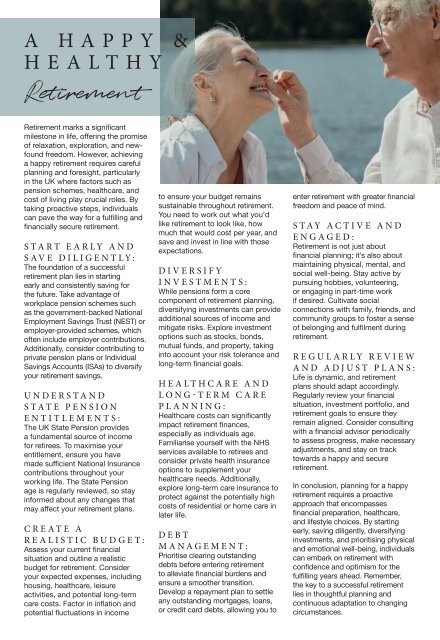West Dorset Living Apr - May 2024
Spring has officially sprung! This edition is packed with fun for all the family, plus lots of delicious recipes, home inspiration and, of course, our usual dose of fabulous competitions
Spring has officially sprung! This edition is packed with fun for all the family, plus lots of delicious recipes, home inspiration and, of course, our usual dose of fabulous competitions
Create successful ePaper yourself
Turn your PDF publications into a flip-book with our unique Google optimized e-Paper software.
A HAPPY &<br />
HEALTHY<br />
Retirement<br />
Retirement marks a significant<br />
milestone in life, offering the promise<br />
of relaxation, exploration, and newfound<br />
freedom. However, achieving<br />
a happy retirement requires careful<br />
planning and foresight, particularly<br />
in the UK where factors such as<br />
pension schemes, healthcare, and<br />
cost of living play crucial roles. By<br />
taking proactive steps, individuals<br />
can pave the way for a fulfilling and<br />
financially secure retirement.<br />
START EARLY AND<br />
SAVE DILIGENTLY:<br />
The foundation of a successful<br />
retirement plan lies in starting<br />
early and consistently saving for<br />
the future. Take advantage of<br />
workplace pension schemes such<br />
as the government-backed National<br />
Employment Savings Trust (NEST) or<br />
employer-provided schemes, which<br />
often include employer contributions.<br />
Additionally, consider contributing to<br />
private pension plans or Individual<br />
Savings Accounts (ISAs) to diversify<br />
your retirement savings.<br />
UNDERSTAND<br />
STATE PENSION<br />
ENTITLEMENTS:<br />
The UK State Pension provides<br />
a fundamental source of income<br />
for retirees. To maximise your<br />
entitlement, ensure you have<br />
made sufficient National Insurance<br />
contributions throughout your<br />
working life. The State Pension<br />
age is regularly reviewed, so stay<br />
informed about any changes that<br />
may affect your retirement plans.<br />
CREATE A<br />
REALISTIC BUDGET:<br />
Assess your current financial<br />
situation and outline a realistic<br />
budget for retirement. Consider<br />
your expected expenses, including<br />
housing, healthcare, leisure<br />
activities, and potential long-term<br />
care costs. Factor in inflation and<br />
potential fluctuations in income<br />
to ensure your budget remains<br />
sustainable throughout retirement.<br />
You need to work out what you’d<br />
like retirement to look like, how<br />
much that would cost per year, and<br />
save and invest in line with those<br />
expectations.<br />
DIVERSIFY<br />
INVESTMENTS:<br />
While pensions form a core<br />
component of retirement planning,<br />
diversifying investments can provide<br />
additional sources of income and<br />
mitigate risks. Explore investment<br />
options such as stocks, bonds,<br />
mutual funds, and property, taking<br />
into account your risk tolerance and<br />
long-term financial goals.<br />
HEALTHCARE AND<br />
LONG-TERM CARE<br />
PLANNING:<br />
Healthcare costs can significantly<br />
impact retirement finances,<br />
especially as individuals age.<br />
Familiarise yourself with the NHS<br />
services available to retirees and<br />
consider private health insurance<br />
options to supplement your<br />
healthcare needs. Additionally,<br />
explore long-term care insurance to<br />
protect against the potentially high<br />
costs of residential or home care in<br />
later life.<br />
D E B T<br />
MANAGEMENT:<br />
Prioritise clearing outstanding<br />
debts before entering retirement<br />
to alleviate financial burdens and<br />
ensure a smoother transition.<br />
Develop a repayment plan to settle<br />
any outstanding mortgages, loans,<br />
or credit card debts, allowing you to<br />
enter retirement with greater financial<br />
freedom and peace of mind.<br />
STAY ACTIVE AND<br />
ENGAGED:<br />
Retirement is not just about<br />
financial planning; it’s also about<br />
maintaining physical, mental, and<br />
social well-being. Stay active by<br />
pursuing hobbies, volunteering,<br />
or engaging in part-time work<br />
if desired. Cultivate social<br />
connections with family, friends, and<br />
community groups to foster a sense<br />
of belonging and fulfilment during<br />
retirement.<br />
REGULARLY REVIEW<br />
AND ADJUST PLANS:<br />
Life is dynamic, and retirement<br />
plans should adapt accordingly.<br />
Regularly review your financial<br />
situation, investment portfolio, and<br />
retirement goals to ensure they<br />
remain aligned. Consider consulting<br />
with a financial advisor periodically<br />
to assess progress, make necessary<br />
adjustments, and stay on track<br />
towards a happy and secure<br />
retirement.<br />
In conclusion, planning for a happy<br />
retirement requires a proactive<br />
approach that encompasses<br />
financial preparation, healthcare,<br />
and lifestyle choices. By starting<br />
early, saving diligently, diversifying<br />
investments, and prioritising physical<br />
and emotional well-being, individuals<br />
can embark on retirement with<br />
confidence and optimism for the<br />
fulfilling years ahead. Remember,<br />
the key to a successful retirement<br />
lies in thoughtful planning and<br />
continuous adaptation to changing<br />
circumstances.


















